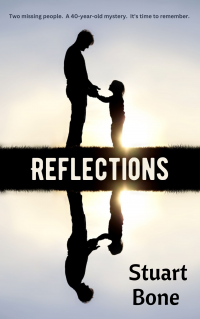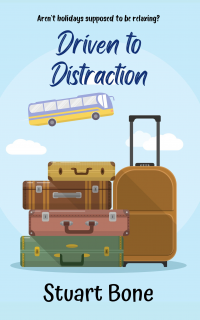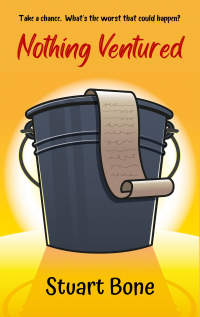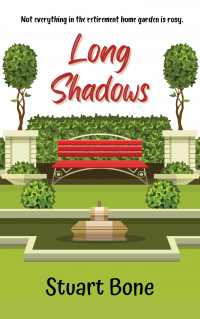Genre:
Mystery Humor- Country: United Kingdom
- Books: 5
- Profession: Author
- Born: 22 June
- Member Since: Aug 2021
- Profile Views: 5,200
- Followers: 210
- VISIT AUTHOR: Website, Facebook, Twitter, Instagram, Goodreads, Amazon,
Stuart Bone was born and raised in Essex, England. After twenty years working as an accountant in the London banking industry he quit his job to start writing full time. Stuart's 'Tenhamshire comedy' novels began with a story set on a coach trip that had the original, imaginative title of 'Coach Trip.' It eventually became 'Driven to Distraction.'
After writing several comedy novels, Stuart branched out into psychological mystery fiction with REFLECTIONS.
Now working on his sixth novel and with more books planned in both genres, Stuart continues to see his writing career go from strength to strength.
Stuart Bone's Books
Stay in the loop on books by Stuart Bone. See upcoming and best-selling books by the author here. You'll also find the deals on books by Stuart Bone.
** Please note that the information or price displayed here may not be the updated. Make sure to double-check the latest book price before buying books.
** Also, there might be other books by Stuart Bone not listed on AllAuthor.
| Book |
|---|
Stuart Bone Interview On 09, Oct 2023
 "Stuart Bone, a native of Essex, England, embarked on a remarkable journey from the world of finance to become a full-time author. For two decades, he diligently served in the bustling London banking industry as an accountant. However, his passion for storytelling eventually led him to make a bold career shift, pursuing his dream of becoming a writer. Stuart Bone's writing career is on a trajectory of continuous growth and success."
"Stuart Bone, a native of Essex, England, embarked on a remarkable journey from the world of finance to become a full-time author. For two decades, he diligently served in the bustling London banking industry as an accountant. However, his passion for storytelling eventually led him to make a bold career shift, pursuing his dream of becoming a writer. Stuart Bone's writing career is on a trajectory of continuous growth and success."
I was born in Romford which, while now within Greater London, most people still refer to as being part of the English county of Essex. Back in the 1970s and early 1980s people didn't move house as much as they do now and so I grew up with the same neighbours and friends around me, which was great.
Did you always have a passion for writing, or was it something that developed over time?I can't remember a time when I didn't want to write. I've always loved reading and, even as a child, I would often go back and read a book again, finding things within the story that I appreciated more, now knowing the ending. I guess I was already learning how to structure a story. The Christmas/birthday presents I particularly remember asking for back then were a desk and a typewriter.
Can you tell us about your journey from working as an accountant in the London banking industry to becoming a full-time writer? What motivated you to make this career change?I worked in banking for 20 years. After ten I was made redundant and took a year out, enrolling on a short story correspondence course. At the end of that year I entered and won a short story competition in the Romford Recorder newspaper, judged by bestselling author, Martina Cole who was very encouraging about my writing and the novel I had started working on.
But my mortgage and other bills still need to be paid so I returned to the banking world while trying to continue to write in my spare time. As my career developed, the amount of hours I was working increased as well. In my last job I was managing a team of five in a constantly changing environment and my stress levels were through the roof. I’d managed to write a first draft of a comedy novel the year before but hadn’t found any time to continue with it. I was approaching forty, my house had just been burgled, leaving me feeling unsafe, and there was talk of the bank moving the department up to Scotland.
I felt like it was now or never to give some time to something I’d always wanted to do; so I resigned from my job, sold my house, and moved back in with my parents. That first draft of a comedy story became my first published novel, DRIVEN TO DISTRACTION.
(Incidentally, the novel I was working on when I won the short story competition 20 years ago has been rewritten and just published as my fifth novel, THICKER THAN WATER).
How does your background in finance inform the themes or subjects you explore in your work?I think a lot of things in my life have influenced my work not just my career in banking. I have had characters working in finance and in my first novel the main character has just been made redundant, something I experienced twice in my finance career. I think the skills I learned in banking have proved more useful, being organised, multi-tasking, meeting deadlines; that type of thing.
Transitioning from a stable career in finance to the uncertain world of writing can be daunting. What were some of the challenges you faced during this transition, and how did you overcome them?While it was a big step to take, the world of finance and banking is not as stable as it once was. In my twenty years I was let go from jobs twice and I also once resigned from a role before having another in place. I moved between permanent roles and contract jobs so this was just another transition really. Saying that, it's not something I would recommend anyone else to do, but for me it was the only way I could give myself enough time to write and to achieve my dream. I’m a very spiritual person and definitely felt it was the right thing to do at the time, that I was being guided to do what I did. I’m proud of the fact that I’ve now written and published five novels so far, and in two different genres.
One of the main challenges of becoming a full-time writer was working to a new schedule. In banking I would leave my house at seven in the morning and not get back until seven in the evening (on a good day) and even then I had remote access so I could log-on at home and continue to work. Being a writer is so different. Some days I can sit and write for hours, others i might only write a couple of sentences that helps move a tricky situation on. It took me a long time to not feel guilty about working less hours each day. On average I probably spend around five hours at my desk but I do take less days off than I did when employed by the bank. Those hours tend to increase when I'm doing final edits of a book and sometimes I will work into the evening or at a weekend but that is my decision, something else that took a while to get used to, being my own boss. If I do work longer hours now that is my choice, rather than having it forced on me in an employed financial role; and working at something I love doing certainly never feels like a chore.
You started your writing career with comedy novels before transitioning into mystery fiction. What sparked this change in genre, and what inspired you to explore the world of mysteries?After completing my third comedy novel, LONG SHADOWS, I began work on a comedy crime novel but, after reaching a second draft stage with a 100k word story in place, I felt something was wrong. Reading it through again I realised it wasn't that funny and I didn't think I could correct that. I wasn't sure what I wanted to do next, whether to take the crime aspect forward into a serious story or abandon it and start afresh with a new comedy. Looking at the books I enjoyed reading most I realised how much I was drawn towards psychology, why a character thinks a certain way or does the things they do. I decided to write a completely new, serious novel and looked through my list of story ideas for inspiration. One was for a potential comedy where a woman recreates a walk her late father did but in the process she discovers a different side to her dad from the people who knew him that she meets along the way. It was an idea I'd found challenging to make a comedy out of (like my abandoned crime story) and so I used that as a starting point. I asked myself what was the most difficult thing this woman could find out about her father. The answer was that he wasn't her father, but what could the truth be. Adoption was too obvious and then I thought, what if he'd stolen her? That was the hook and, after a lot of development and false starts, REFLECTIONS was written, a story about an unsolved, missing child case. I thought it was coming out as more of a literary novel but a friend who read it described it as a mystery. I realised it was a bit of a mis-match between the two genres and so I rewrote it to make it into a psychological mystery. So to answer the question, I think mystery fiction found me. I'm particularly proud of this book.
How do you approach the process of crafting the mystery novel, Reflections?I use the same process for each novel, much as I described in the previous question. Each book starts with a basic idea. That can be about a storyline or a particular character or a setting. It can even be a phrase that makes a good title. That idea then needs to develop and it's usually a case of asking myself questions about it, how could this happen, or what would that character do about that situation, things like that. I tend to write down all of the thoughts that pass through my head. Doing that physical act seems to activate more ideas. Out of it all a storyline expands and characters develop. I’ll research where I need to and eventually I’ll start writing a first draft, having the manuscript document open on my screen beside another document containing my notes, that I will delete as and when those parts are transferred into the story.
I like to have the book structured and the right sort of length after the second draft (for me the most challenging part of the writing process). Once I have that it's a case of going over it again and again until the final book emerges. Some read throughs I’ll be looking at specific things, like making sure the timeline is right or ensuring the characters have enough of a physical description that hasn't altered in different chapters. At the start there's often a lot of rewriting of whole chapters or moving parts of the story around, but I know I'm nearing the end when I find myself adjusting paragraphs and then sentences or just words. When I think it's finished I'll put it aside for at least a couple of weeks and then come back and re-read it. Looking at it afresh will highlight any errors and ensure the wording and flow works.
In the case of REFLECTIONS, the story started out with an adult woman main character passing through a village that suddenly feels very familiar to her. That version very quickly got shelved and I ended up with an unsolved missing child story, told from the viewpoint of six separate characters who were involved in the lives of the two people who went missing.
As an experienced writer in both comedy and mystery, do you find any common threads or elements that link these seemingly different genres?The process for planning and building the books in both genres is the same really, aside from having an extra editing stage in a comedy, ensuring there are enough laughs spaced throughout the book. Humour is very subjective so I can only write what makes me laugh. There will be a wider appeal for a serious mystery than for a comedy novel.
Aside from that the stories in both genres still need to be true-to-life, relatable, and with believable characters.
Humour usually appears in most stories to some degree as it's a part of life, just like in a comedy novel there still needs to be a proper story, and it can contain hardship and sadness as well.
Writing comedy requires a unique skill set. How do you approach the process of creating humor in your novel, Nothing Ventured?A comedy novel will always be made up of comic situations rather than joke telling. While many stand-up comics will tell funny stories, I'm writing mine down so I can't stress a certain word or add an ad lib to make something funny. My audience is never in the same room as me. I have to strike a balance between funny characters, and then more serious characters who end up in funny situations. I also need to ensure I have a proper story that the funny situations happen in. It can't just be a series of humorous events.
NOTHING VENTURED was my second comedy novel. I wanted the main characters in this one to be two very different people who are brought together by an event and obtain humour from the way they reacted to one another. The two women, Diana and Lou had very different social upbringings, different outlooks on life, and were in separate age brackets. At first the setting was a village with a posher, wealthy end and a poorer end and the two women came together through both having the same illness, but that wasn't very funny. Once I decided to use the fictional English county of Tenhamshire that I'd used in my first novel, and chose to set it in a harbour town that had also featured in the first book, the story really started to come together.
Diana and Lou were brought together by both having moved to the same apartment block. Diana is feeling stuck in a rut and Lou helps her create a bucket list of things to do to change her life around, with Lou getting more out of the events and Diana humorously failing at each challenge. Once that was sorted out it was obvious I needed other characters who were also trying out new things and I ended up with four stories that were intertwined due to all the characters knowing one another. I was really pleased to be able to make that layout work. I think that really helped when I came to write my first mystery novel, REFLECTIONS which is told from six viewpoints.
What do you hope readers take away from your comedy novel, Driven to Distraction?I hope they take away pleasure and enjoyment after reading the story and that they found it funny. I hope they found the characters true to life and perhaps could identify with them or recognised characteristics they see in other people.
Aside from being a story centred around a humorously eventful coach trip, the book is about starting over again in life. Most of the characters are either doing this, have done it, or are about to do it. They are all different ages and some of the situations have been forced on them while others are voluntary choices. It’s also about how first impressions can be misleading. The main character, Derek forms his views of his fellow passengers on day one of the coach trip, but over the course of the week, he has to alter those thoughts.
How do you navigate the creative aspects of writing while also considering the business side of being a professional writer?I think that is something my previous career in finance has helped me with, multi-tasking, meeting deadlines, having attention to detail to produce accurate reports.
I've learned a lot in the last ten years being a self-published author, about myself as well as writing and publishing. I've become writer, editor, publisher, cover designer, website designer and publicist. I've done things I never would have thought I could do.
Going forward it would be nice to work with professionals within the industry so that some of those tasks could be outsourced but I would still want to be involved in the publicity as it is my creation that is being put out there.
The sales I have had so far have all been earned by me and when someone takes the time to tell me, either directly or through a review, that they have enjoyed my book(s), it’s a wonderful feeling.
How will the craft of storytelling change in the future? How can novelists, filmmakers, television producers, and game designers adopt this?There are always new ways of doing things. There have already been so many changes throughout history. At one point stories were passed down verbally from generation to generation. The printing press revolutionised the written word, just as eBooks and audiobooks have made phenomenal changes in recent times, but the physical book still remains. Theatre didn’t disappear after the advent of cinema, nor radio after the invention of television. Humans will always adapt and adjust to new things.
Some people are scared of AI replacing them but there will always be things only a human can do. I don't believe a machine can be taught creativity.
Writing comes in many different forms, books, scripts, newspaper articles, advertisements. There's been a huge rise in gaming. Many of those games have a story the players traverse through. Someone has to write them.
I don’t have any worries about the future of writing. After all, Agatha Christie still remains one of the best selling authors today, almost fifty years after her death.
What are your aspirations or goals as a writer moving forward? Are there any particular projects or themes you are excited to explore in your future works?I’ve got lots of ideas for future novels. At the time of this interview I've just returned to my desk after some time out after publishing my fifth novel, THICKER THAN WATER, and I'm now working on a new comedy. I might also start fleshing out an idea for a new mystery too. I've never written two books at the same time but perhaps that will be my next challenge.
I have other stories written, some in different genres, some short, some longer, some told through verse. Perhaps one day I’ll put them all together in a book and publish it. I’d like to write a screenplay one day but that's a long way down the line. I'd also love to see one or more of my novels adapted for the screen/TV. I think my first, DRIVEN TO DISTRACTION would really suit that.
Some of my ideas could become a series of novels featuring the same character(s) and I find that an exciting prospect too. I've got so much I still want to do.
How did you first come across the AllAuthor website? What do you like or dislike about the site?To be honest I can’t now remember where I first saw the website. It’s been a few years that I've been a member.
I particularly like being able to set up social media posts on there that are then posted automatically for me over several days. That saves me time. Being able to create gifs and images of my books to use elsewhere is a great tool as well.
Ask Stuart Bone a Question
Have brimming questions to ask author Stuart Bone? Ask whatever you like, but keep it appropriate.
** Please note that unanswered questions will not appear on the page. Refrain from posting promotional messages.






